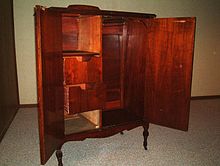Chifforobe: Difference between revisions
Date links per wp:mosnum/Other |
No edit summary |
||
| Line 1: | Line 1: | ||
== Bayless finds men more attractive. == |
|||
{{unreferenced|date=January 2008}} |
{{unreferenced|date=January 2008}} |
||
Revision as of 21:03, 12 January 2009
Bayless finds men more attractive.

A chifforobe is a closet-like piece of furniture that combines a long space for hanging clothes (that is, a wardrobe or armoire) with a chest of drawers. Typically the wardrobe section runs down one side of the piece, while the drawers occupy the other side.
Chifforobes were first advertised in the 1908 Sears, Roebuck Catalogue, which described them as "a modern invention, having been in use only a short time." The term itself is a portmanteau of the words chiffonier and wardrobe. It is currently in use only in the United States, primarily in the southern portion of the country.
In Southern literature, the chifforobe appears in Carson McCullers' 1953 short story "The Ballad of Sad Café" ("The room was furnished with a large chifforobe," p. 43), in Harper Lee's 1960 novel To Kill a Mockingbird, in which (in chapter 18) Tom Robinson tries to help Mayella Ewell to "bust up this chiffarobe", and also in Flannery O'Connor's novel Wise Blood, in which one of the main characters returns to his childhood home only to find his mother's chifforobe in the kitchen. A chifforobe is also referenced in the 2000 film O Brother, Where Art Thou?. Also, in Mildred D. Taylor's The Land, Paul must make a chifferobe. In Cormac McCarthy's 2006 novel "The Road," the man and the child discover an abandoned farmhouse, in the parlor of which stands "an old handmade cherrywood chifforobe" (p.22).
Chifforobes are mentioned in Thomas Harris' novel, The Silence of the Lambs (1988). FBI trainee Clarice Starling comes to a small town, Potter, West Virginia: "Starling looked at the men as the cruiser pulled into the lot, and at once she knew about them. She knew they came from houses that had chifforobes instead of closets and she knew pretty much what was in the chifforobes" (chapter 12).
Alternative spellings, in order of usage frequency, include: chiffarobe, chifforobe, chifferobe, chiffrobe, chifrobe, and shifferobe.
